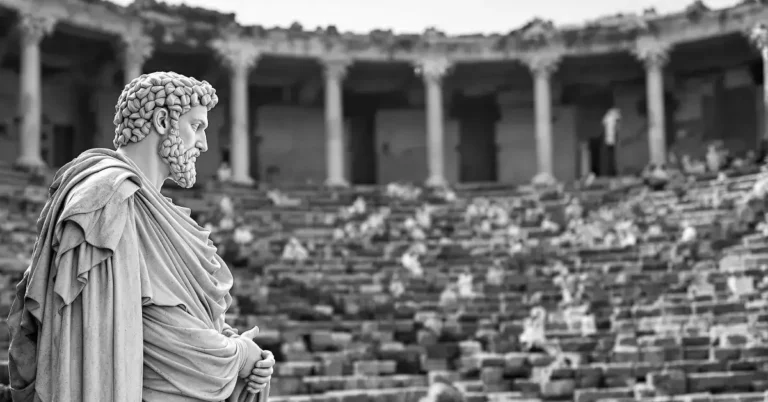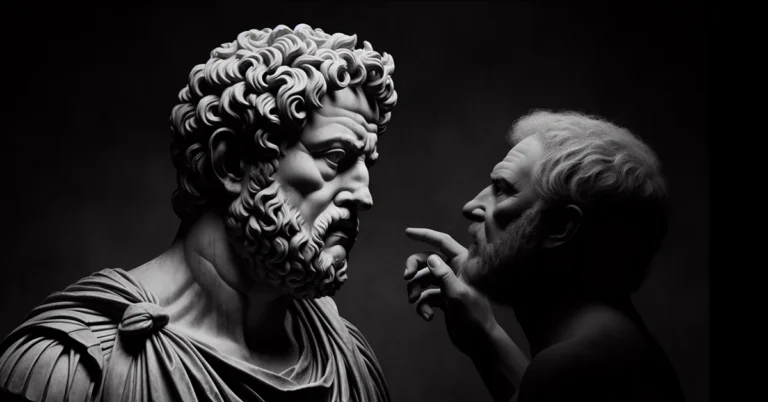
Emotions can feel like a raging storm, unpredictable and overwhelming. But what if you could be the calm in the middle of that storm? The ancient Stoics—Gaius Musonius Rufus, Marcus Aurelius, Seneca, and Zeno—believed that true strength comes from within, from mastering your reactions rather than being ruled by them. They didn’t suppress emotions; they learned to navigate them with wisdom and discipline. In a world full of stress, distractions, and daily frustrations, their lessons on emotional control are more valuable than ever.
What is the Lifestyle of a Stoic?
A Stoic’s lifestyle is built around discipline, rational thinking, and emotional balance. It’s not about suppressing feelings but about understanding and guiding them. Stoics practice self-mastery techniques that train them to respond, not react. This means journaling, reflecting, and applying the dichotomy of control practice—focusing only on what they can influence and letting go of the rest.
Are Stoics Emotionless?
Absolutely not. The idea that Stoics feel nothing is a myth. Stoicism isn’t about eliminating emotions—it’s about mastering them. It teaches you to experience emotions without being ruled by them. Marcus Aurelius, in his Stoic journaling prompts, reflected on his feelings daily, processing them instead of suppressing them. Emotional regulation in Stoicism is about channeling emotions constructively, not pretending they don’t exist.
How Do Stoics Control Their Emotions?
1. Turn Challenges into Growth
Every hardship is a lesson in disguise. Instead of asking, “Why is this happening to me?” flip the script: “What can this teach me?” The Stoic concept of “What stands in the way becomes the way” means obstacles aren’t barriers—they’re stepping stones.
Picture teaching a kid to ride a bike. They stumble, they fall, they get frustrated. But each fall builds their balance. Life works the same way—every challenge is refining your emotional resilience. Seneca’s wisdom on voluntary discomfort practice shows us that facing small hardships prepares us for bigger ones. Instead of avoiding difficulties, lean into them. They’re making you stronger.
2. Preserving Inner Calm Through Journaling
Journaling isn’t just writing—it’s a mental reset. Marcus Aurelius on Stoicism left behind his Meditations, a collection of thoughts meant to refine his character. When life gets overwhelming, instead of letting emotions spiral, write them down. Then ask yourself:
What’s in my control here?
How can I grow from this?
By sorting through your thoughts, you stop reacting and start responding. This is how you cultivate clarity and develop self-mastery techniques that keep your emotions in check.
3. The Power of Gratitude
When things go wrong, the easiest trap is focusing on what’s missing. But gratitude flips that mindset. Instead of dwelling on problems, focus on what you already have. The Stoics called this negative visualization exercises—imagining life without your comforts so you appreciate them more. Marcus Aurelius wrote, “When you arise in the morning, think of what a privilege it is to be alive.”
Gratitude isn’t denial—it’s resilience. It reminds you that even in difficulty, there’s something to be thankful for. It’s how Stoics build emotional regulation and fortitude, training themselves to see opportunity even in hardship.
4. Master Your Emotions Thru Responding, Not Reacting
Emotions can hijack your judgment if you let them. Stoics train themselves to pause before reacting. When anger or frustration rises, take a breath and ask:
Is this reaction rational or impulsive?
What would my highest self do in this situation?
Will this matter in a week, a month, or a year?
By creating space between stimulus and response, you take back control over your emotions instead of letting them control you.
5. Practicing Voluntary Discomfort
Stoics deliberately expose themselves to small hardships—cold showers, fasting, or going without luxuries. Why? Because comfort makes people weak. Seneca advised practicing discomfort so that when real adversity strikes, you’re prepared. By training your mind and body to endure discomfort, you build resilience against emotional distress.

Master Your Emotions & Watch Level Stoic Video
How Do Stoics Deal with Difficult People?
Difficult people are inevitable, but your reaction is within your control. Epictetus’ teachings on discipline remind us that people don’t upset us—our judgments about them do. When faced with conflict:
Pause before responding.
Ask, “Is this worth my energy?”
Focus on your own conduct, not theirs.
Instead of feeding negativity, lead by example. Stoics practice mindfulness to detach from pettiness and maintain their inner peace.
Should a Stoic Cry?
Stoicism doesn’t forbid emotions—it refines them. Tears aren’t weakness; they’re a natural human response. The key is not letting emotions dictate actions. Seneca taught that emotional expression should be balanced with reason. If crying helps process grief, it’s fine. What matters is what comes next—do you stay stuck in sorrow, or do you grow from it?

What Stoicism Is All About
Practicing Stoicism isn’t about becoming indifferent—it’s about becoming stronger. It’s about:
Training your mind with daily Stoic exercises.
Applying Stoic decision-making to remain rational under pressure.
Using mental fortitude training to overcome obstacles.
Living intentionally with a Stoic morning routine.
Emotions don’t have to control you. With Stoic resilience building and modern Stoicism applications, you can develop the self-discipline to remain calm, clear-headed, and unshaken—no matter what life throws your way.




